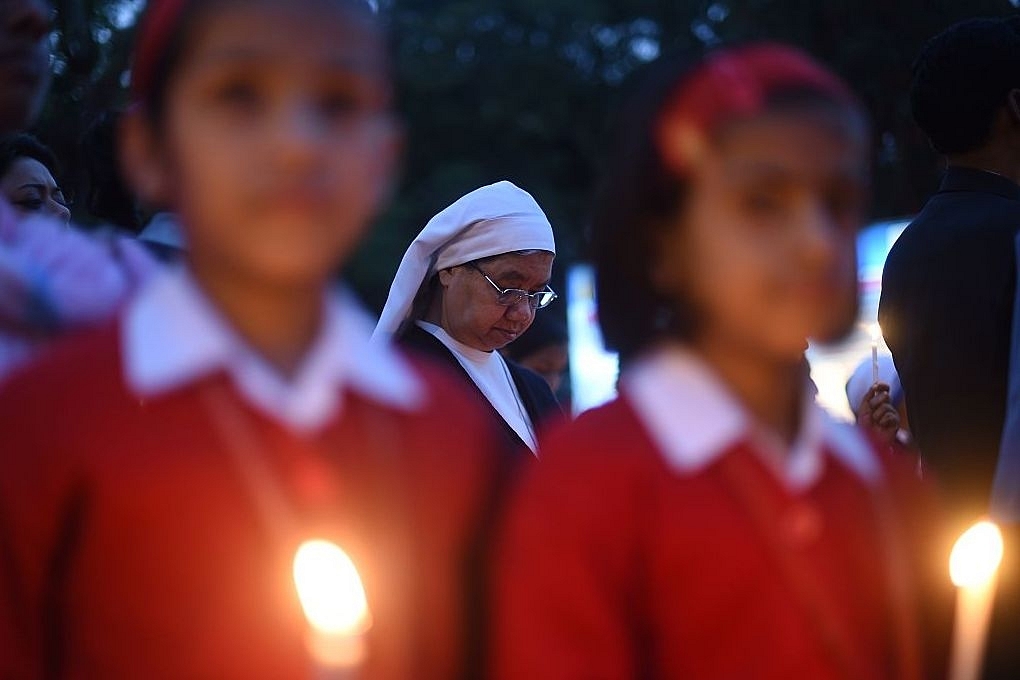News Brief
NCMEI Has Given Minority Certificates To 13,602 Education Institutions; 55 Per Cent Of Them Run By Christians

Students at a minority-run institution in New Delhi. (SAJJAD HUSSAIN/AFP/GettyImages)
The National Commission for Minority Educational institutions (NCMEI) has granted Minority Status Certificate to 13,602 education institutions run by the management belonging to six religious minority communities notified as such by the National Commission for Minorities (NCM). Out of these, 7,550 institutions i.e. over 55 per cent are run by Christians, 5,153 institutions are run by Muslims, 300 institutions by Sikhs, 63 institutions by Buddhists, 522 institutions by Jains and 14 institutions by the management belonging to Parsi community.
The Union Minister for Minority Affairs Mukhtar Abbas Naqvi provided this information while responding to a question by Member of Parliament in Rajya Sabha Rakesh Sinha.
The minister further told that as per 2019-20 data from Unified District Information System for Education (UDISE), a database on schools in India developed by the Ministry of Education, there are 50,536 minority schools in the country. Out of these, 27,259 schools are run by Muslim community, 15,808 schools by Christians, 1,140 schools by Jains, 720 schools by Buddhists, 600 schools by Buddhists and 126 by Parsis.
On the question of government aid to minority institutions, the minister said that the ministry doesn’t keep community-wise data.
In August this year, the National Commission For Protection of Child Rights had published a report after conducting a nationwide survey of 23,487 minority schools revealing how different treatment of minority and non-minority institutions (granted by the Constitution and laws) has been a net negative not only for the country in general but even for the students of minority communities in particular.
“It (the exemptions granted to minority institutions) had considerable consequences for students from minority communities since in the absence of guidelines, minority schools functioned arbitrarily, setting their own norms in terms of admission of students, recruitment of teachers, implementation of curriculum, pedagogy, etc.
Certain detrimental effects were observed: while, on the one hand, there were schools that admitted only a certain class of students, becoming cocoons populated by elites, some institutions became ghettoes of underprivileged students languishing in backwardness,” the report had stated.
The report listed four interesting findings.
First, more than 85 per cent of the total minority schools secured their certificate in the years 2005-2009 and later. NCMEI which awards the certificate at national scale came into being in late 2004.
Second, Christian community, which makes up 11.54 per cent of the total minority religious population, contributes to 71.96 per cent share of the total religious minority schools of the country.
Third, 62.50 per cent of students in minority schools belong to non-minority communities.
Fourth, only 8.76 per cent of the total student population in minority schools belongs to the disadvantaged sections of the society.
The NCPCR report had recommended to extend the provisions of the Right to Education Act to minority educational institutions and had demanded creation of appropriate administrative system for the purpose of meaningful realisation and effective implementation of linguistic minority rights.
Recently, a public interest litigation has been filed in the Supreme Court to make provisions of RTE applicable to minority institutions.
Support Swarajya's 50 Ground Reports Project & Sponsor A Story
Every general election Swarajya does a 50 ground reports project.
Aimed only at serious readers and those who appreciate the nuances of political undercurrents, the project provides a sense of India's electoral landscape. As you know, these reports are produced after considerable investment of travel, time and effort on the ground.
This time too we've kicked off the project in style and have covered over 30 constituencies already. If you're someone who appreciates such work and have enjoyed our coverage please consider sponsoring a ground report for just Rs 2999 to Rs 19,999 - it goes a long way in helping us produce more quality reportage.
You can also back this project by becoming a subscriber for as little as Rs 999 - so do click on this links and choose a plan that suits you and back us.
Click below to contribute.
Latest